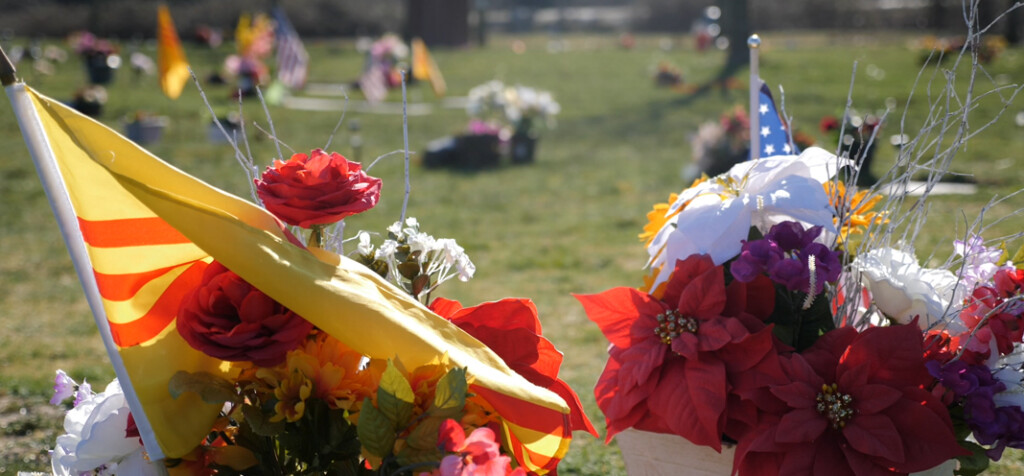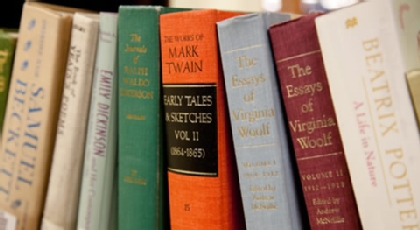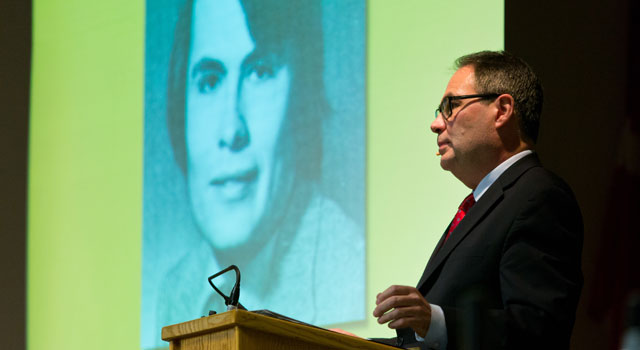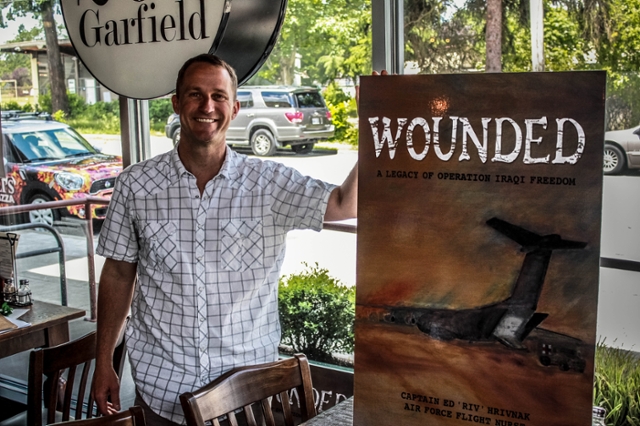Page 64 • (742 results in 0.023 seconds)
-

The combined Elliott Press and the Thorniley Collection of Antique Type at PLU now makes up the largest collection of printing equipment in the Pacific Northwest, both in size and variety of type styles and eras represented. Last month, with the tiniest pica of type…
and so on). Typefaces include those first introduced from 1690 to 1900, making the collection remarkable in breadth. There are examples of type cast at foundries from around the country and abroad (Barnhart Brothers & Spindler, Western, Bruce, Dickinson, Philadelphia, Central, Cleveland, Johnson, as well as Mackellar, Smiths & Jordan). By 1892, about 85 percent of all foundries in the United States had merged into American Type Founders (ATF). It is rare — especially in the U.S. — to see type cast
-

PLU Assistant Professor of Communication Dr. Kate Drazner Hoyt has directed a documentary which will premiere at the Grand Cinema in Tacoma on Monday, November 21. The film is one installment in the Chinese Reconciliation Project Foundation ’s “Our Communities, Our Neighbors” film series. Funded…
able to work with a former student on this important project. What has been the timeline of this project? I got connected with my producer Tina Huynh for a story from the Vietnamese community. We began having planning meetings last December and January and started the filming process in February. We continued interviews and b-roll collection through June and had the first cut of the film in August. Why is it important for our community to understand how Vietnamese-American immigrants honor their
-

Ash Bechtel always wanted to be in healthcare, she just wasn’t sure which direction to take — nursing or medical school. So, Ash counseled with family and academic advisors before deciding to pursue a biology major that would put her en route to becoming a…
her junior and senior years after serving as Resident Assistant (RA) in the Spanish Wing in Kreidler. Part of the draw to becoming an RA was that Ash knew she could connect with the Hispanic community in new ways. This wasn’t just about service; it was also about exploring her own identity as a Mexican American and understanding more fully the issues impacting minority students. This experience launched her into becoming student body president, where she was a champion for change on campus
-
Homecoming 2008 This year’s Homecoming activities begin today, with a talk at 10:30 a.m. by Scott Westering, ’82, PLU’s head football coach, at the Homecoming Chapel. With the theme, “Get in the Game,” the annual event will focus on the camaraderie of teams, specifically the…
Hour Reunions: These will all take place from 9 a.m. to 10:15 a.m. and are free. The following classes and affinities will gather individually for coffee and reminiscing: 1947 – 1949, 1958 and Pear Bowl Alumni in the Morken Center for Learning & Technology 1963, 1968, 1973, 1983, 1988, 1993 and African American Alumni in the University Center. Homecoming Celebration Brunch: This will take place from 10:30 a.m. to noon at Olson Auditorium. The cost is $20. All alumni and friends are invited to this
-

Writers welcomed By Kari Plog ’11 During the summer, students in PLU’s Master in Fine Arts Creative Writing program gather on campus for their summer residency. As part of the three-year program, the students meet four times for short summer residencies of about 10 days…
outside experience was at the American Academy in Rome, where she studied her writing alongside composers, artists and other writers. “It was a really rich environment,” she said. “If it hadn’t been for this program I wouldn’t have had this opportunity.” Students come into the MFA program with specific needs, and there is an independent focus on the specific needs of each student. Rubin said students are assigned a personal mentor, who helps them develop their craft throughout the entirety of the
-

As the keynote Meant to Live speaker at Homecoming, Gordon Campbell ’75 tells Lutes to follow their passion. (Photo by John Froschauer) Gordon Campbell ’75 tells Lutes to follow their passion. By Barbara Clements Gordon Campbell ’75 has three bits of advice for students or…
third bit of advice? Enjoy it, take risks, and learn to think on your feet. It may come in handy. Read Previous International students eat up American culture Read Next ‘Follow your bliss’ COMMENTS*Note: All comments are moderated If the comments don't appear for you, you might have ad blocker enabled or are currently browsing in a "private" window. LATEST POSTS Caitlyn Babcock ’25 wins first place in 2024 Angela Meade Vocal Competition November 7, 2024 PLU professors Ann Auman and Bridget Haden
-
https://www.youtube.com/watch?v=5OxFSjKvcPs Showcasing the versatility and artistry of student performance and talent, the evening promises to dazzle with original and creative choreography. A stunning collection of various dance genres features student, guest and faculty compositions. Dance 2013 Pacific Lutheran University Dance ensemble presents Dance 2013 ,…
. There are nine student choreographers this performance: Sara Stiehl – senior dance team captain from Colorado who choreographed four of the dances, Mamie Howard – a junior from California directs the PLU Lute Nation step team and created a video of the history of African American women in America and choreographed a dance to accompany the video, Alumna Emily Fahey choreographed a piece to the poetry of Dylan Thomas, First-year Jonathan Adams created a hip-hop dance about domestic violence, other
-

What are you reading this summer? Join the ‘Full Campus Read’ Patty and President Tom Krise are participating in the Common Reading Program. Are you? The PLU community will be reading ‘Into the Beautiful North’ this summer as part of the Common Reading Program By…
the panel. Some professors are also integrating the book into their curriculum. Lisa Marcus, associate professor of English, will again be teaching the book in her Writing 101 seminar on “Banned Books.” She wants students to recognize that Urrea’s book has been banned in Arizona as part of a push to suppress ethnic studies, particularly works that address Mexican-American history and experience. Marcus stresses that beyond the story and relatability of the characters, it is important to think
-

Ed Hrivnak ’96 with a poster of his new book “Wounded,” which tells of his experiences in the Iraq War. (Photo by Quinn Huelsbeck ’16) Scribbled notes on surgical tape become new book about Iraqi War by PLU nurse By Barbara Clements University Communications In…
and in the New Yorker – by scribbling notes to surgical tape and then sticking them to his flight suit while he was out in the field. He’d then transcribing thoughts to a notebook and to emails home to his family in 2003. The notes talked about parties and practical jokes – a la MASH – to let off steam, and of soldiers, looking up from ruined bodies, begging Hrivnak to tell them everything was going to be alright. Hrivnak reflects on survivor’s guilt, along with the frustration with the American
-

Angie Jimenez ’14 will walk across the Tacoma Dome stage as she graduates from Pacific Lutheran University on May 24, grateful for the support of her parents, Dale Benson and the Minds Matter program. (Photo: John Froschauer/PLU) Graduate overcomes tight budgets, ice storms and bureaucracy…
to stay legally in the U.S. Her father works as a caretaker of a property, and her mother at a restaurant. This summer, Jimenez will be working at Centro Cultural of Washington County in Cornelius, Ore., as a summer program supervisor and possibly an ESL teacher. She eventually plans to go to law school, with the aim of specializing in immigration law. Jimenez arrived in the U.S. at age 7, her entire family coming north at the urging of an uncle, she remembers. She grew up as a typical American
Do you have any feedback for us? If so, feel free to use our Feedback Form.


